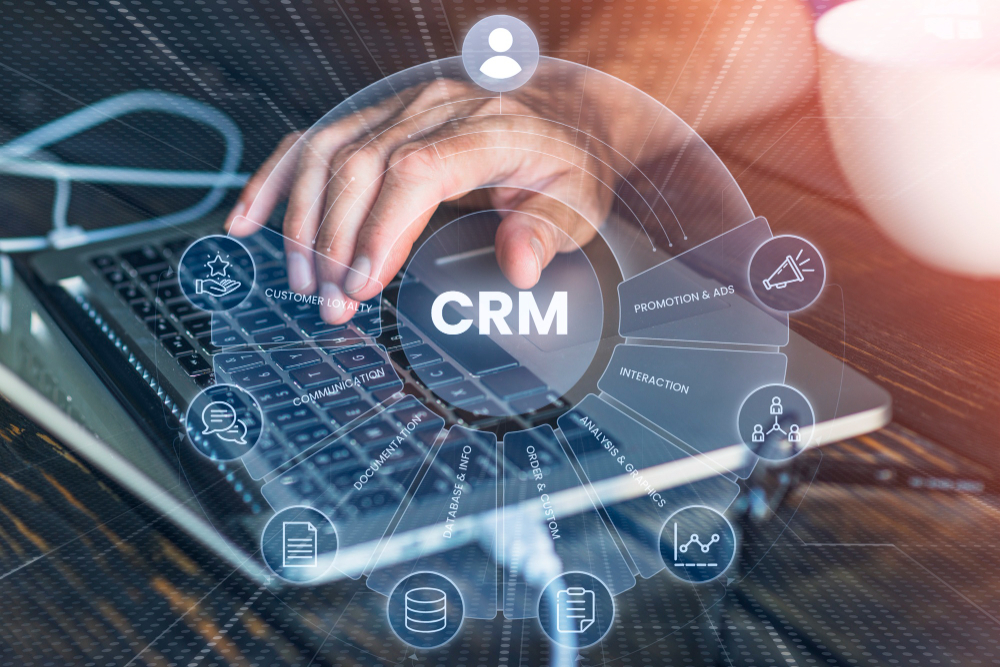Customer Relationship Management system (CRM) | Comprehensive Guideline
September 4, 2024

Have you ever heard about Customer Relationship Management?
This term has gained popularity in the tech industry recently. To learn more about it, continue reading this article.
What is Customer Relationship Management (CRM)?
A Customer Relationship Management system (CRM) is a powerful tool that enhances how your business interacts with its customers. Its main objective is to strengthen relationships and increase profits by simplifying processes and fostering continuous communication with clients. CRM systems help businesses eliminate unnecessary steps in their operations, resulting in greater efficiency and higher profitability.
A CRM system is more than a contact management tool. It is a complete platform that improves marketing, sales, e-commerce, and customer service. This system helps businesses acquire new clients. It also offers support and services that boost customer satisfaction, improving the overall buying experience.
Benefits and Phases of Customer Relationship Management (CRM)

CRM systems provide many benefits. They collect customer data from different sources, such as websites, emails, phone calls, and social media. This information is automatically organized into a comprehensive record, allowing businesses to maximize the value of this data in strengthening customer relationships.
The CRM process starts by collecting and storing customer data. This helps companies analyze customer behavior and predict future needs. This analysis helps sales representatives work more effectively and respond faster, leading to happier customers and increased revenue.
CRM systems do more than help with customer relationships. They also integrate with other business applications, like document signing and accounting. The latest versions of these systems have built-in artificial intelligence, which helps automate administrative tasks. This saves time and effort, allowing you to focus on more important activities.
Enhancing Customer Relationship Management with a CRM System
A CRM system is important for organizing and storing customer information. It provides businesses with a complete record for each client and company. This record helps the sales team communicate better with clients and understand their needs. Through this organization, representatives can work faster and smarter, providing clear guidance on how to interact with customers. They can also accurately predict customers’ future actions and needs.
Enhancing Integration with Other Business Applications
CRM systems manage customer relationships and integrate with other business tools, including document signing, accounting, and surveys. These integrated tools help strengthen customer relationships by streamlining processes and saving time and effort. The latest CRM systems use AI and smart automation to automate tasks like data entry and lead routing. As a result, your team can focus on more important and productive activities.
Insights: Understanding Customers with Precision
One of the standout features of a CRM system is its ability to generate insights and statistics automatically. These insights help businesses understand customer behavior, predict what customers will do next, and identify their needs. This allows businesses to offer personalized experiences, building loyalty and creating more growth opportunities.
More Advantages of CRM Systems
CRM systems offer a wide range of benefits that help businesses improve customer interactions and increase profitability effectively. Here are the key advantages that a CRM system can provide, contributing to your business success:
- Better Customer Experience: CRM gives contact center staff and field service workers a complete view of customers, helping them provide personalized service that meets customer needs quickly. By collecting and analyzing real-time data, businesses can better understand customer needs and offer solutions that improve satisfaction.
- Increased Customer Retention: Retaining customers is key to any business’s success. CRM allows you to deliver personalized service that impresses customers and increases their loyalty. You can use real-time analytics to find the best offers, choosing the right time and channel to deliver them. Doing this increases the chances of retaining customers for a long time.
- Increased Sales Revenue: CRM provides a clear view of the sales process, helping improve efficiency and boost revenue. With tools like Salesforce automation and opportunity management, you can enhance sales strategies, increase cross-selling, and grow e-commerce capabilities. These actions contribute to steady revenue growth.
- Increased Operational Efficiency: CRM helps automate many administrative processes, enabling your team to accomplish more with less effort. By automatically scheduling customer follow-ups and directing tasks based on set priorities, you can improve workflow, avoid slow manual processes, and boost overall efficiency.
- Smarter Work and Better Interaction: CRM facilitates easy information sharing between teams and departments, providing customers with a better and more connected experience. You can offer better and more interactive service across all communication channels, boosting customer satisfaction and increasing their engagement with your brand.
These benefits make a CRM system essential for companies that want to improve customer relationships and grow their business.
How CRM Can Benefit Your Business
Whether you run a small business or a large company, a CRM system is important. It helps you store information in one place, accessible on different devices. A CRM system also improves customer interactions and boosts satisfaction. If your current processes are not meeting these needs, it’s time to consider adopting a CRM system. Here’s how it can help:
- Easily Access Basic Information: A CRM system allows you to quickly and accurately answer essential questions like: “How many customers do we have?” “What was our win/loss ratio in the last quarter?” “What were our revenues last month?” and “Who closed the most deals?” This information helps you make informed decisions that enhance your business strategies.
- Ensure Data Accuracy to Avoid Wrong Decisions: Incorrect data often leads to bad decisions. Failing to verify the accuracy of data entered into the system can cause significant problems. CRM systems have automated data validation features that lower the chances of errors and ensure your information is accurate, leading to better decisions.
- Improve Communication with Current and Potential Customers: In today’s world, there are many ways to communicate. Multi-channel communication is a key benefit of CRM systems. CRM helps you attract potential customers by connecting with websites, social media, phone calls, and more. This covers all touchpoints in the sales process, increasing the chances of turning leads into loyal customers.
By implementing a CRM system, you can enhance your overall customer relationship management, boosting customer satisfaction and increasing the effectiveness of your business operations.
Types of Customer Relationship Management Systems

Customer Relationship Management (CRM) systems can be classified into three main types based on their nature of use and functions
-
Operational CRM
Objective: Manage direct interaction with customers and improve daily operations.
Basic functions:
- Managing contacts and potential clients.
- Automation of operations: sales, marketing, and customer service.
- Track tasks, meetings, and sales stages.
 Example of usage:
Example of usage:
- Sending automatic welcome messages.
- Tracking the progress of a deal with a specific client.
-
Analytical CRM
Objective: Analyze customer data and understand their behavior to improve decision-making.
Core Functions:
- Advanced reports and analytics on customers.
- Classifying customers by value or interest.
- Sales forecasts and future trends.
Example of Use:
- Analyzing purchasing behavior to tailor offers.
- Identifying the highest value segments for marketing focus.
3. Collaborative CRM
Objective: Enhance collaboration among different teams within the organization (sales, marketing, technical support).
Core Functions:
- Sharing customer information across departments.
- A unified center for communication history with each customer.
- Support for multiple channels (calls, emails, social media…).
Example of Use:
- Customer service can see all previous sales interactions with the customer to provide a better response.
Note:
Sometimes, modern CRM systems integrate all three types into one system to provide a comprehensive experience.
How CRM Works
-
Data Collection & Storage:
- In this phase, the system collects customer data from various channels (such as the website, phone calls, emails, and social media). This data is organized and stored within the system, allowing for easy access in the future.
- The CRM system stores information such as contact details, sales history, customer service interactions, and even notes specific to each customer.
-
Data Analysis:
- After collecting the data, the system analyzes it to understand customer behaviors, preferences, and purchasing patterns.
- This analysis can identify the most profitable customers, opportunities for selling more products or services, and also provide forecasts about future customer needs.
-
Customer Interaction Management:
- In this phase, the CRM system manages daily interactions with customers. This includes tracking phone calls, sending emails, and organizing appointments or meetings.
- Promotional offers and services are tailored based on customer behavior and previous data.
- It also includes automated responses and setting alerts for employees to follow up with customers in a timely manner.
-
Automation of Tasks & Processes:
- The CRM system automates many routine tasks such as sending reminders to customers, updating records automatically, sending promotional offers, and updating reports.
- Process automation helps to reduce human errors and improve operational efficiency, allowing the team to focus on more strategic tasks.
-
Customer Service & Support Improvement:
- The CRM system is used to provide faster and more accurate customer support by enabling support teams to quickly access customer records and understand their history with the company.
- Support is tailored based on customer needs and interaction history, enhancing overall customer satisfaction and increasing loyalty.
-
Performance Monitoring & Reporting:
- The CRM system provides detailed reports on sales performance, customer service interactions, conversion rates, and marketing campaign performance.
- The system can provide insights into how processes are improving, allowing companies to make data-driven decisions and enhance their strategies in the future.
-
Ongoing Relationship Management:
- After a sale or service is completed, the CRM system continues to track the customer’s relationship with the company to ensure ongoing engagement.
- This includes customer loyalty programs, re-engaging dormant customers (those who have stopped purchasing), and continuously sending promotional offers.
-
Personalization of Offers:
- Based on the collected and analyzed data, the CRM system helps in personalizing offers and services that suit each customer individually, increasing opportunities for cross-selling or upselling.
The new version of these systems includes integrated artificial intelligence technologies, contributing to the automation of administrative tasks and saving time and effort to focus on more valuable activities.
What is the Best CRM Software?
Arqam offers the best CRM software specifically designed to meet the needs of businesses of all sizes. With this system, you can manage all customer interactions, tailor offers based on customer data, and effectively improve customer service. You can also track all stages the customer goes through from the first interaction to post-sale.
Unique Value Offered by Arqaam’s CRM Service:
-
Simple and Effective User Interface:
- The CRM system from Arqaam features a smooth and user-friendly interface, allowing the team to interact with the system seamlessly without the need for extensive training.
-
Advanced Data Analysis:
- The Arqaam CRM system provides advanced data analysis tools that help you understand your customers’ behaviors and offer tailored solutions that meet their needs, enhancing customer satisfaction and loyalty.
-
Process Automation:
- The CRM system helps automate many routine tasks such as sending reminders and automated responses to inquiries, contributing to improved efficiency and reduced human errors.
-
Integration with Other Systems:
- The Arqaam CRM system allows integration with other systems in your company, such as cloud call centers, sales management, and technical support, enhancing information flow and making operations more organized and effective.
-
Multi-Channel Support:
- The CRM system supports customer interactions across multiple channels (such as phone, email, and social media), ensuring continuous communication with customers regardless of their preferred channel.
-
Customization Options:
- The Arqaam CRM system allows you to customize it to fit your unique business needs. You can modify fields, reports, and alert settings to suit the type of industry or sector you operate in.
-
Data Security and Protection:
- Arqaam is committed to providing the highest levels of security to protect customer data and ensure its privacy, making the Arqaam CRM system the ideal choice for companies that prioritize the protection of their customers’ information.
-
Continuous Technical Support:
- Arqam offers 24/7 technical support to ensure the system operates efficiently and provides assistance in case of any issues or inquiries.
About Arqaam and Its Services for You..
Arqaam boasts exceptional capabilities and over 8 years of experience in effectively managing customer services and maintaining customer satisfaction through providing call center solutions, cloud call centers, customer management systems, chatbots, conversational robots, and VoIP, among other diverse and cutting-edge technologies sought by large and emerging companies.
We also work on training our team to be ready and possess all the features and skills needed to perform their tasks effectively, whether in call center services or other services provided by the company.
Thus, we take pride in our team, which includes a group of excellent experts in customer interaction, addressing inquiries, and assisting in the best possible way.
Arqaam’s solutions and technologies cover everything your establishment needs in terms of services and products, in addition to professional supervision and follow-up to keep you informed of what is happening at all times.
هل لديك اى استفسار؟
لا تتردد بالاتصال بنا نحن نعمل على مدار الساعة للاجابة عن استفسار لديك
- 920029985
- sales@arqaam.sa






